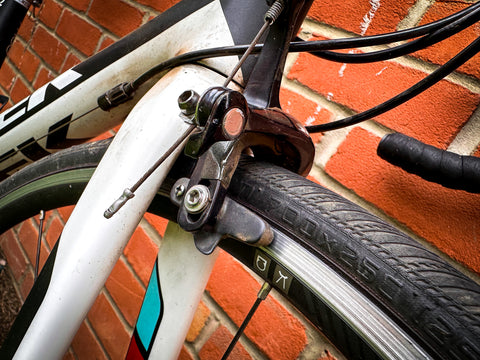Is changing from disc brake to rim brake worth it?
Cycling in the past decade has changed dramatically. We have bikes that accelerate faster, have excellent aerodynamics to push those top speeds incredibly high, and brakes that can stop us in half the time they could years ago. We're constantly offered upgraded technology each year, and it can get challenging to stay on top of it as bikes with new technology don't always come cheap.
A common question we are asked is if upgrading from rim brakes to disc brakes is worth the expense and hassle it comes with. In this article, we'll answer that question by discussing the differences between rim brakes and disc brakes, the cost of upgrading, and whether it is worth it.

What are Rim and Disc Brakes?
Before we start, it's important to understand what rim brakes and disc brakes are. Rim brakes are what you would have seen on all road bikes years ago and typically sit on the top of the fork and at the base of the seat post. To slow the bike down, they use brake pads to grip each side of the wheel's rim to create the friction needed to stop.
Disc brakes are much more modern, and the technology comes from mountain biking. Typically disc brakes are attached to the front fork and rear chain stay. To slow you down, they grip a disc attached to the bike's wheel on the left side of the hub.

Rim Brakes
Rim brakes are made to be very lightweight and provide a good amount of stopping power. They are actuated by cables, extremely reliable, easy to work on, and cheap to maintain. They are very small in size, and in many frame designs, they can be hidden to improve aerodynamics.
Rim brakes provide a good amount of stopping force but compared to a disc brake, they are much weaker. They are not great in poor weather conditions and, over time, do wear the rim of your wheels down. Heavy use can be tough on the hands and take a fair amount of grip strength.
Pros
- Easy to work on
- Cheap to buy and maintain
- Aerodynamic
Cons
- Not amazing stopping power
- Wear your wheels down
- Poor performance in bad weather
- Take good grip strength

Disc Brakes
Disc brakes provide excellent stopping power in all conditions. They were originally introduced on mountain bikes and have come across to hybrid, road, cyclocross, and gravel in recent years. You get two types, mechanical disc brakes, and hydraulic disc brakes. Mechanical work using cables to activate the pads and hydraulics work with fluid, these can also self-adjust their disc brake pads to help prevent disc rubbing. They don't require the use of the wheel rim to slow down and create friction between the brake pads and a disc rotor.
Disc brakes are more complex and, because of this, are more expensive to buy and set up. When servicing comes round, it can be more pricey too, as they do have more parts that might need attention. They are also slightly heavier than rim brakes.
Pros
- Excellent Stopping power
- Work great in all conditions
- Do not cause rim wear
- Hydraulics are very easy to use with little grip strength
- Hydraulic disc brakes can self adjust
Cons
- More expensive to buy and service
- Harder to work on
Hydraulic or Mechanical Disc Brakes?
Hydraulic disc brakes are much better than mechanical disc brakes. They are much easier on the hands, have much better braking power, and don't need any adjustment over time. Mechanical brakes are often seen as a cheaper option for suppliers, and they use them to save on cost. There's little to no advantage over their hydraulic counterparts.

What does it take to Upgrade to Disc Brakes?
When it comes to upgrading to disc brakes, it is a case of investing in a new bike. Disc brake bikes are very different from rim brake bikes, and it is not a simple job of just moving a few parts around and chucking a few cable ties on. Some cyclists have done conversions, but we don't recommend it as, in the process, you damage the bike's structural integrity.Cost of Upgrading
The cost of upgrading from a rim brake bike to a disc brake bike, is the cost of a new bike. We get asked by many cyclists about just changing the frame, but you will still require the disc brake calipers, disc brake wheels, brake lever, all the new cabling, and various other parts, such as disc brake rotors.

Is it worth upgrading to disc brakes?
The answer to this question is not as simple as you might think, as we believe that only in certain situations is it worth changing over to disc brakes. Here's when we think it's worth upgrading and when not to.Worth Changing
Bikepacking
If you plan on epic bikepacking trips that will take you all over the world carrying loads of kit on different types of terrain and in all weather conditions, then we highly recommend going over to disc brakes. They will make such a huge difference and will be so much easier on your hands.Road Racing
If you plan on road racing and going into competitive situations, then you will get better performance out of disc brakes. With many other racers going across to disc brakes, it makes sense to change over to level the playing field for yourself as far as performance goes and not end up going into the back of someone who has superior components.Off-Road Riding
If you're still using rim brakes for off-road riding, then you're definitely going to want to upgrade. Disc brakes are better than anything else in muddy conditions, and they give you a great increase in performance and are much less damaging to your rims.Riding in poor conditions
If you plan on going out in all seasons and are not shy of a rainy or snowy day, having disc brakes will give you a great advantage in bad weather. It's going to reduce the lag on your brakes, which could be the difference in avoiding an accident.

Not worth changing
Time Trailing and Triathlon
When it comes to time trailing and triathlon, a sport where you typically ride alone, and you're not always seeing aggressive climbs, descents, and weather, many people are still using rim brakes. They are better for aerodynamics, and the majority of equipment still favors the rim brake.Casual Fair Weather riding
If you only get the bike out on sunny days and don't plan on hitting the circuit for a race, then a disc brake road bikes probably won't make much difference to your riding. Unless you plan on buying a new bike, rim bikes are just fine for this situation.Are Disc Brakes the Future?
There's no denying that disc brakes are getting more and more popular each year. We believe the next ten years, it will continue this way, and it will become normal to have disc brakes on all kinds of bikes. Companies who make equipment are also putting more time into products for disc brake bikes. We highly recommend that you consider a disc brake bike next time you're considering a new bike, even if just to future proof yourself.Wheel selection
It is vital that you have the right wheels for your riding style. With so much hype out in the market it can hard to know which wheels are right for you.
At Wheelscience we are riders too, so we want to make sure you have the right tools for the job.
We've put together a short questionnaire to help select the right wheels for you.
If you are after track wheels - please click here.
If you would rather just email than please do. Peter@wheelscience.com
You can also see what some of our riders have been up to on our RIDERS page HERE




Leave a comment